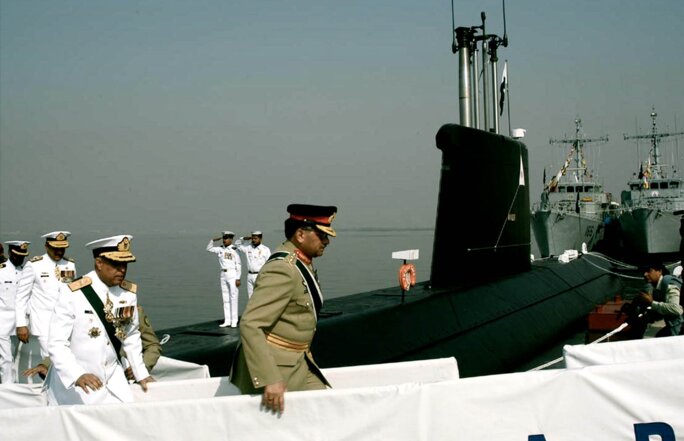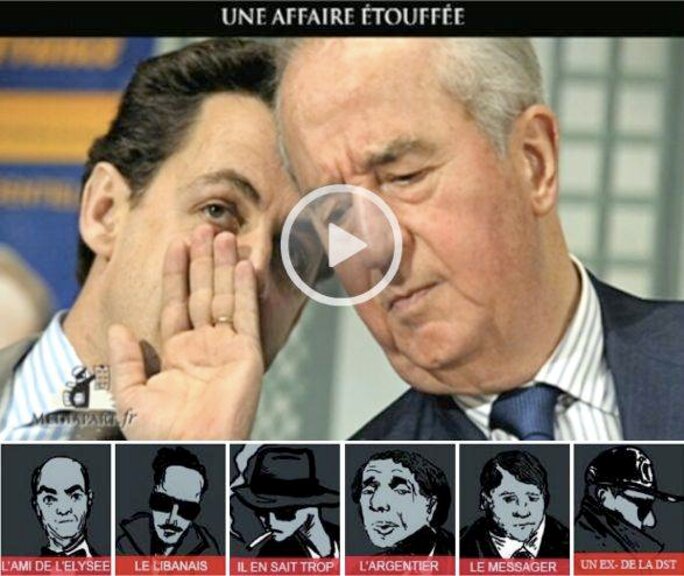When the Pakistani president Asif Ali Zardari met his French counterpart Nicolas Sarkozy at the ElyséeWhen the Pakistani president Asif Ali Zardari met his French counterpart Nicolas Sarkozy at the Elysée Palace in August, there was one subject that was most officially not on the agenda. This was the so-called 'Karachi affair', a complex story involving murder and allegations of corruption on high and illegal party funding.
The affaire is sparked by a two-year investigation led by Paris-based investigating magistrate Marc Trévidic into a bomb attack in Karachi on May 8th, 2002 which left 15 people dead, including 11 French employees of the defence contractor DCN (Direction des constructions navales). They were working in Karachi on the construction of three Agosta class submarines sold to Pakistan by France in a deal concluded in September, 1994 by the government of France's then prime minister Edouard Balladur.
The magistrate has definitively ruled out the involvement of Al Qaeda, contrary to what was suggested by officials in both countries at the time. Trévidic is now working on the theory that the Karachi victims were targeted as part of a settling of accounts for the non-payment by France of kickbacks to Pakistani intermediaries involved in establishing the Agosta contract.

Storm brewing? Presidents Sarkozy and Zardari at the Elysee Palace, August 2010.© Reuters
Like Sarkozy and Balladur in France, President Zardari, who was implicated at the time in several financial affairs, earning him the name 'Mr 10%', denies any involvement. "When these events took place [in 2002] I was in prison," Zardari told French daily Le Monde in an interview published on August 4th this year. "I don't see how I could have a link to this affair. For us this attack has nothing to do with the submarine contract [ ...] it was a pure act of terrorism."
While, at present, there is no material proof of a link between the attack and the submarine contract, investigating judge Trévidic has already gathered an important mass of documents and witnesses that reveal the shady financial and political actions surrounding the conclusion of the Agosta deal. Two key names have emerged from the inquiry.
In France it is Nicolas Sarkozy, who was budget minister between 1993 and 1995 and as such the person who approved the financial arrangements for arms contracts, including the payment of hidden commissions. In Pakistan it is Asif Ali Zardari, a government minister at the time and, importantly, husband of the prime minister of the day, Benazir Bhutto, whom he married in 1987.
'Bribery went from the street-cleaner to the prime minister'
In 1994, at the time of the Agosta contract negotiations, it was perfectly legal for a company or state to 'corrupt' foreign decision makers politicians, officials, military officers to help win an international contract. This practice was outlawed under an agreement among OECD member countries in 1997, which France finally ratified in September, 2000.
So when in 1992 France was lining up a Pakistan submarine deal, the state - the majority shareholder in DCN could thus 'corrupt' in all legality. And, in the face of stiff Swedish and German competition at the time, it didn't hold back.
The bribes were readied, even though Pakistan, which would choose France in 1994, was one of the most unstable countries in the world thanks to the corruption of its ruling classes, extreme nationalism and a slide towards fundamentalism.
Out of the 826 million-euro total of the sale of the Agosta submarines, the DCN reserved an initial amount for commissions that totalled 51.6 million euros (6.25% of the contract value). These were destined for intermediaries who would later distribute the cash to dignitaries of the purchasing country. Their purpose was persuasion. A state body was set up to provide the link between the DCN and the intermediaries, namely the Société française de matériels d'armement (Sofma), whose mission was corruption.

Enlargement : Illustration 2

Questioned about this issue on November 23rd, 2009 by judge Trevidic, DCN's former international director Emmanuel Aris told the magistrate: "To my mind, the 6.25% paid by Sofma covered all the political or military decision-makers. [They] were in my view to be for all those involved, from the street-cleaner, so to speak, to the Pakistani prime minister, passing at every level concerned." During his evidence, Emmanuel Aris never used the word 'corrupted' when talking about the ultimate beneficiaries of the commissions but, more cautiously, said that they were 'covered'.
But in front a French parliamentary fact-finding inquiry into the Karachi affaire, Emmanuel Aris was a little more specific. He told members of parliament that the bribes allocated by Sofma "were to allow the creation of a favourable environment for the clinching of the contract. [It] allowed everyone to be taken care of, the street-cleaners, low-ranking officers, the head of the naval general staff, the minister of finance as well as Madame Bhutto's entourage."
The most active Pakistani agent working on behalf of the DCN and Sofma in relation to the Agosta contract negotiations was Amir Lodhi. Brother of a former Pakistani ambassador to the United States, Amir Lodhi is a high-flying businessman and financier with a murky past. Threatened by the enormous scandal of the BCCI bank, which was linked during its collapse in 1991 to money laundering relating to terrorism and criminal networks, Lodhi came out of it legally unscathed after agreeing to cooperate with investigators. However, for a country like France seeking to sell submarines in 1994, he was an essential figure. For Amir Lodhi had a major card up his sleeve; he was close to Asif Ali Zardari, the husband [of Bhutto] with control over state contracts.
'Four percent was for Zardari and Bhutto'
On April 6th, 2010, Henri Guittet, who was director general of Sofma at the time of the Agosta deal, told Judge Trévidic that of the 6.25% of the planned commissions "there was 4% for Zardari-Bhutto through the intermediary of Lodhi, who perhaps was keeping a little for himself." He also told the magistrate: "I believe that in the case of Zardari they had created a company to receive this money. I don't remember the name of the company. It was perhaps Swiss or in Panama [ ...] Out of the remaining amount there was to be 1.5% for Lodhi himself, a little for Ansari [another intermediary] of about 0.25%, and around 1% for Zafar Iqbal [also another intermediary]."
Guittet, who is probably among those best placed to know the goings on of the Agosta deal, gave further details to the magistrate: "As for the 4% destined for Zardari-Bhutto I believe that 1% was due upon the signing of the sales contract, which means at the time when everything could start and especially when the deposit and first instalment were paid, and 1% a year later. The remaining 2% was to be paid pro rata with the customers' payments."
But there was more. In the summer of 1994, when France had been chosen by Pakistan and the contract was just waiting to be signed in Islamabad which occurred on September 21st - something quite extraordinary happened. At the last minute, a new round of commissions was to be made available, on the express orders of the Balladur government. Two Lebanese businessmen came on the scene and were to receive 4% in extra commissions, which amounted to around 33 million euros.
One of these agents was

Ziad Takieddine, who was close to Balladur's entourage, including Nicolas Sarkozy whom he liked to introduce as "a friend". The suspicions today about possible hidden political funding in France through the Agosta contract centre on his role. Takieddine was said have to picked up, via an obscure financial trail that involved Luxembourg and the Isle of Man, a portion of the 33 million euros released at the last minute in the Agosta deal, to be ultimately redistributed to French political decision-makers. The aim, it is alleged, was to finance the 1995 presidential campaign of Edouard Balladur, for whom Nicolas Sarkozy was spokesman then campaign director. This is what is known as a 'retro-commission', an accounting procedure which has always been illegal in France.
The second agent "imposed" by the Balladur government the word employed by a former DCN senior official - was called Abdulrahman El-Assir. Also close to the Balladur camp, El-Assir had another advantage. "He was a friend of Azif Ali Zardari, the husband of prime minister Benazir Bhutto, who was the key to government contracts in Pakistan," noted Claude Thévenet, a former French counter-espionage officer hired by the DCN to investigate the Karachi attack, in a report dated September 11th, 2002.
The judge travels to Switzerland
The links between Zardari and El-Assir are far from fanciful. British officials, who had harboured suspicions of corruption by Benazir Bhutto and her husband, disclosed in April 2001 that several Swiss bank accounts of the former ruling couple in Islamabad had been credited on August 22nd, 1995 then on September 1st, 1995 one year after the signing of the Agosta deal with three million dollars transferred from a New York Citybank account. The account belonged to Abdulrahman El-Assir.
At present, it is impossible to affirm that those three million dollars corresponded to the bribes surrounding the Agosta deal but according to British investigators the sums involved do have a connection with the payment of hidden commissions.
As a result of an investigation first launched by the Pakistan government that succeeded Benazir Bhutto in 1997, the Swiss authorities also uncovered movements of money that are allegedly compromising for the Bhutto-Zardari couple. In that affair, Bhutto (who was assassinated in 2007) and her husband were pursued by several judges in Geneva for an alleged major money laundering scam, before a timely legal amnesty in Pakistan forced the Swiss authorities to halt their investigation in 2008 - just before Zardari became president of Pakistan.
It was a short-lived respite. A judgement in December 2009 by the Supreme Court in Islamabad, which considered the amnesty unconstitutional, in theory allows the re-opening of investigations. According to information gathered by Mediapart in Geneva, the name of Abdulrahman El-Assir also appeared in the Zardari dossier on the fringes of a major arms contract signed between France and Pakistan in the middle of the 1990s. According to a local source, this concerned the Agosta submarine deal.
At the end of May this year, Judge Trévidic travelled to Geneva to study the Swiss investigating file. "He wasn't disappointed by his visit and has asked for the transmission of a number of very specific documents," said Alix Francotte Conus, the investigating judge in Geneva overseeing French-Swiss judicial cooperation, in an interview with Swiss daily Le Temps.
Meanwhile, suspicions that the French authorities are deliberately blocking Trévidic's enquiries were reinforced by a witness statement given last month by retired general Philippe Rondot, a former special services officer who worked for many years in French foreign intelligence. Rondot's illustrious career included a major role in the capture of the notorious Venezuelan terrorist Illich Ramirez Sanchez, AKA Carlos the Jackal.
Questioned by Trévidic on September 27th, he revealed that he travelled to Karachi to lead a joint mission to involving the French domestic and foreign intelligence services, the DST1 and DGSE, in June 2002, just weeks after the bomb attack against the French engineers. Trévidic had never been informed of the operation, despite his repeated requests to the French defence ministry for access to all classified reports relating to the attack.
Also last month, informed sources have told Mediapart that the president of the French parliament's defence commission, UMP2 member of parliament Guy Tessier, this summer refused a request from Trévidic for the transcripts of interviews conducted by the commission's enquiry into the Karachi attack.
1. The DST is now renamed the DCRI. 2. The UMP is President Sarkozy's ruling conservative Right party.
English version: Michael Streeter
• See the Mediapart video on the Karachi affair:
Karachi: the A-Z of a bloodstained contract



